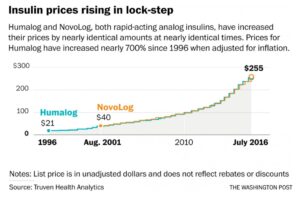© 2024 CSRXP- All Rights Reserved

American Diabetes Association calls on Congress to hold hearings on insulin prices
Nov 18, 2016
American Diabetes Association calls on Congress
to hold hearings on insulin prices
November 18, 2016
ICYMI via Washington Post: American Diabetes Association calls on Congress to hold hearings on insulin prices
The American Diabetes Association’s board of directors is calling on Congress to hold hearings to investigate dramatic increases in insulin prices and to take action to ensure that people have affordable access to the essential drug.
In a resolution, the board asked politicians to examine the entire supply chain for insulin, ranging from the three drug companies that dominate the market to health insurers and the companies they hire to bargain for drug prices. They also called on the companies that make and provide insulin to patients to increase the transparency of pricing, which could help explain why prices have risen and which companies benefit.
The American Diabetes Association said Congress should “take action to ensure that all people who use insulin have affordable access to the insulin they need,” noting that the cost of treating diabetes has “skyrocketed” and insulin prices in Europe are about a sixth of the price in the United States. The association also launched a petition, “Stand up for affordable insulin,” asking people to sign on to let companies and Congress know that greater transparency and attention is needed to soaring insulin prices.
Robert Ratner, the chief scientific and medical officer for the organization said that the move was a follow-up to its February call for greater transparency and other moves by health care companies that could ensure the affordability of insulin.
“Nothing has changed and some things have appeared to get worse,” Ratner said. “We have had discussions with industry — the pharma companies are very much aware of this. They have not been particularly pleased, as you can imagine.”
Insulin was first discovered 95 years ago, but newer versions have been introduced over the years. Some physicians have argued there’s little evidence that some of the newest drugs are superior for most patients. Meanwhile, the list prices of all the drugs have gone up — far outpacing inflation.
Humalog, a form of insulin that carried a sticker price of $21 a vial in 1996, today costs $255. A 34-year-old form of insulin, Humulin, priced at $17 a vial in 1997 now costs $138 a vial. The prices of competing insulins have also often risen in near lock-step.
“I urge my colleagues to keep shining a light on corporations that put profits before patients, and immediately pass legislation to curb the rising costs of this insulin and other lifesaving drugs that our constituents desperately need,” said Rep. Elijah E. Cummings (D-Md.)

Cummings and Sen. Bernie Sanders (I-Vt.) earlier this month called on the Justice Department to investigate the similarly timed price increases for possible price collusion, an accusation insulin makers rejected.
The pharmaceutical industry pushed back strongly against the idea of congressional hearings.
“We should look for common-sense solutions to prevent patient discrimination and remove barriers to accessing care. However, government mandates and interventions are not the solution for patients,” said Holly Campbell, a spokeswoman for the pharmaceutical trade group, PhRMA.
Novo Nordisk, one of the companies that makes insulin, said in a statement that it disagrees with the need for congressional action and noted that the prices that gain attention “don’t reflect the significant rebates and discounts” the company provides to insurers.
“All stakeholders in the diabetes community should work collaboratively to better understand the barriers and solve this affordability challenge,” spokesman Ken Inchausti said.
Sanofi, another pharmaceutical company that makes insulin, said that it has not increased the list price of Lantus, a 15-year-old insulin, in two years.
“In setting prices for our insulin medications, we work to balance helping patients manage their diabetes today and developing ways to improve care in the future,” spokeswoman Anna Robinson said in an email.
An Eli Lilly spokesman referred back to previous statements.
“We acknowledge that the complex reimbursement designs in the U.S. place an unfair burden on people with diabetes and we have expressed our commitment to exploring solutions to this issue,” spokesman Greg Andrew Kueterman said in response to past questions about price increases.
Mark Merritt, president of the Pharmaceutical Care Management Association, said “the key issue is the price of the products.” He noted that the companies he represents, pharmacy benefit managers, have been able to strike deeper discounts by creating lists of covered drugs in which some insulin products are more favorably covered than others.
